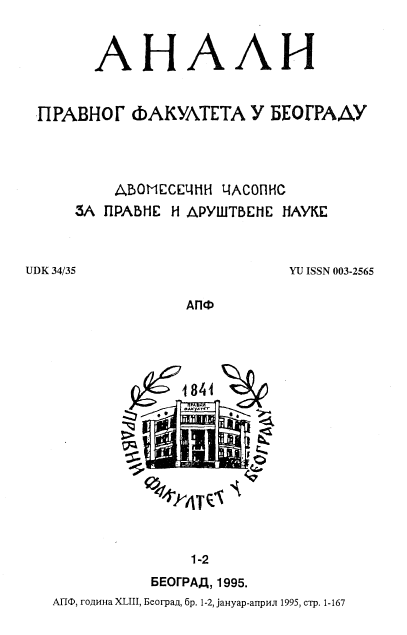МЕЂУНАРОДНОПРАВНА ЗАШТИТА ЉУДСКИХ ПРАВА И ПРАВНИ СИСТЕМ САВЕЗНЕ РЕПУБЛИКЕ ЈУГОСЛАВИЈЕ
INTERNATIONAL LEGAL PROTECTION OF HUMAN RIGHTS AND THE LEGAL SYSTEM OF THE FEDERAL REPUBLIC OF YUGOSLAVIA
Author(s): Budimir KošutićSubject(s): International Law, Human Rights and Humanitarian Law
Published by: Правни факултет Универзитета у Београду
Keywords: Human rights; Universal validity; International law; Security Council - Yugoslavia
Summary/Abstract: The author considers the possibility of universal application in practice and respect for human rights and basic freedoms, in relation to civilizational, spiritual, and cultural differences existing in the contemporary world. There is no doubt, namely, that the position and status of man, as an individual, are different in societies of Christian, Islamic or other kinds of origin. After pointing at the fact that in Europe, after the breakdown of communism and termination of the cold war, democratic ideas have been accepted widely, as well as that it has been recognized that there is a necessity of respecting human rights and fundamental freedoms, the author states that there exist certain differences, especially in the approach to settling the problems of national or ethnical, religious or language minorities. While reminding the readers on former Socialist Federal Republic of Yugoslavia’s insistence on collectively recognizing national minorities rights, as well as on arguments which run counter to such ideas expressed by teh West-European countries, the author concludes that the present times have proved the validity of the arguments of democratic states of Europe in the above respect. While thoroughly respecting the achievements of the West-European democratic states in the field of human rights and basic freedoms, the legal system of the Federal Republic of Yugoslavia has accepted the system of protection of these rights and freedoms according to West European standards, i.e. characteristic for Western democracies. This, however, does not mean that the degree of realization in the Federal Republic of Yugoslavia of such rights and freedoms may be measured by the criteria existing in highly developed democratic countries of the West. In addition to domestic reasons, the scope of realization of human rights in the FR of Yugoslavia is affected by the international blockade of that country. The author therefore asks whether there exist, if so, and/what are the limits for the Security Council of the United Nations Organization in applying the Section VII of the UN Charter.
Journal: Анали Правног факултета у Београду
- Issue Year: 43/1995
- Issue No: 1-2
- Page Range: 57-63
- Page Count: 7
- Language: Serbian

